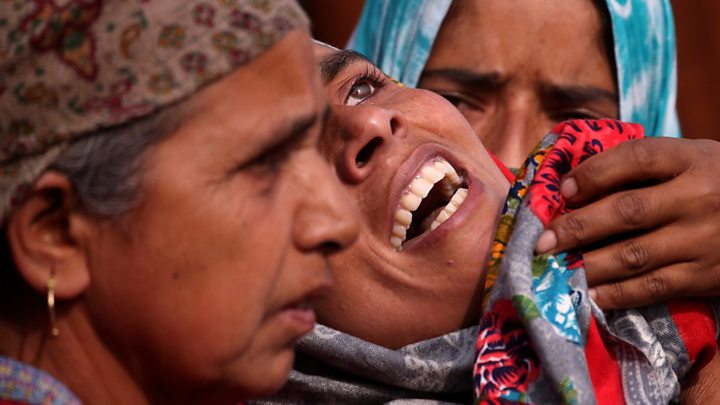India's government has moved to revoke the part of the constitution that gives Indian-administered Kashmir special status in an unprecedented move likely to spark unrest.
Article 370 is sensitive because it is what guarantees the disputed Muslim-majority state significant autonomy,
The entire region is disputed between India and Pakistan. Each claim it in full but control only parts of it.
There has been a long-running insurgency on the Indian side.
Thousands of Indian troops had been deployed to the region ahead of the announcement and tourists were told to leave.
Home Minister Amit Shah introduced the measure in parliament amid massive protests from the opposition. He said it would become law as soon as it was signed by the president.
This means that it will not be voted on in either house of parliament, though Mr Shah said that there would be a discussion.
Soon after the announcement, the Ministry of Law and Justice released an unsigned presidential order spelling out the details of the proposed changes.
The move has been widely criticised with some legal experts calling it an attack on the constitution.
The governing Bharatiya Janata Party (BJP) of Prime Ministed Narendra Modi had promised in its 2019 election campaign to revoke the law. It won a resounding victory in the May-June elections.
Article 370 allows the Indian state Jammu and Kashmir to have its own constitution, a separate flag and independence over all matters except foreign affairs, defence and communications. About 12 million people live in Jammu and Kashmir.
The former chief minister of the state, Mehbooba Mufti, said the move effectively made India an occupying force.
"Today marks the darkest day in Indian democracy," she said in a tweet, adding that the government's "unilateral decision" was "illegal and unconstitutional".
 Media captionIn December Yogita Limaye examined why there had been a rise in violence in Kashmir
The announcement in parliament came hours after two of the state's former chief ministers, including Ms Mufti, were placed under house arrest.
Public meetings have been banned in the state, with mobile networks and the internet also restricted.
In recent days thousands of tourists as well as pilgrims on an annual trek to a major shrine were asked to leave the state immediately amid the deployment of tens of thousands of troops.
India and Pakistan, both nuclear powers, have fought two wars and a limited conflict over the Himalayan territory.
Media captionIn December Yogita Limaye examined why there had been a rise in violence in Kashmir
The announcement in parliament came hours after two of the state's former chief ministers, including Ms Mufti, were placed under house arrest.
Public meetings have been banned in the state, with mobile networks and the internet also restricted.
In recent days thousands of tourists as well as pilgrims on an annual trek to a major shrine were asked to leave the state immediately amid the deployment of tens of thousands of troops.
India and Pakistan, both nuclear powers, have fought two wars and a limited conflict over the Himalayan territory.
 Media captionIn December Yogita Limaye examined why there had been a rise in violence in Kashmir
The announcement in parliament came hours after two of the state's former chief ministers, including Ms Mufti, were placed under house arrest.
Public meetings have been banned in the state, with mobile networks and the internet also restricted.
In recent days thousands of tourists as well as pilgrims on an annual trek to a major shrine were asked to leave the state immediately amid the deployment of tens of thousands of troops.
India and Pakistan, both nuclear powers, have fought two wars and a limited conflict over the Himalayan territory.
Media captionIn December Yogita Limaye examined why there had been a rise in violence in Kashmir
The announcement in parliament came hours after two of the state's former chief ministers, including Ms Mufti, were placed under house arrest.
Public meetings have been banned in the state, with mobile networks and the internet also restricted.
In recent days thousands of tourists as well as pilgrims on an annual trek to a major shrine were asked to leave the state immediately amid the deployment of tens of thousands of troops.
India and Pakistan, both nuclear powers, have fought two wars and a limited conflict over the Himalayan territory.DISCLAIMER: The Views, Comments, Opinions, Contributions and Statements made by Readers and Contributors on this platform do not necessarily represent the views or policy of Multimedia Group Limited.
Latest Stories
-
Smallholder farmers to make use of Ghana Commodity Exchange
4 hours -
I want to focus more on my education – Chidimma Adetshina quits pageantry
4 hours -
Priest replaced after Sabrina Carpenter shoots music video in his church
4 hours -
Duct-taped banana artwork sells for $6.2m in NYC
4 hours -
Arrest warrants issued for Netanyahu, Gallant and Hamas commander over alleged war crimes
4 hours -
Actors Jonathan Majors and Meagan Good are engaged
5 hours -
Expired rice saga: A ‘best before date’ can be extended – Food and Agriculture Engineer
5 hours -
Why I rejected Range Rover gift from a man – Tiwa Savage
5 hours -
KNUST Engineering College honours Telecel Ghana CEO at Alumni Excellence Awards
5 hours -
Postecoglou backs Bentancur appeal after ‘mistake’
5 hours -
#Manifesto debate: NDC to enact and pass National Climate Law – Prof Klutse
6 hours -
‘Everything a manager could wish for’ – Guardiola signs new deal
6 hours -
TEWU suspends strike after NLC directive, urges swift resolution of grievances
6 hours -
Netflix debuts Grain Media’s explosive film
6 hours -
‘Expired’ rice scandal: FDA is complicit; top officials must be fired – Ablakwa
7 hours

